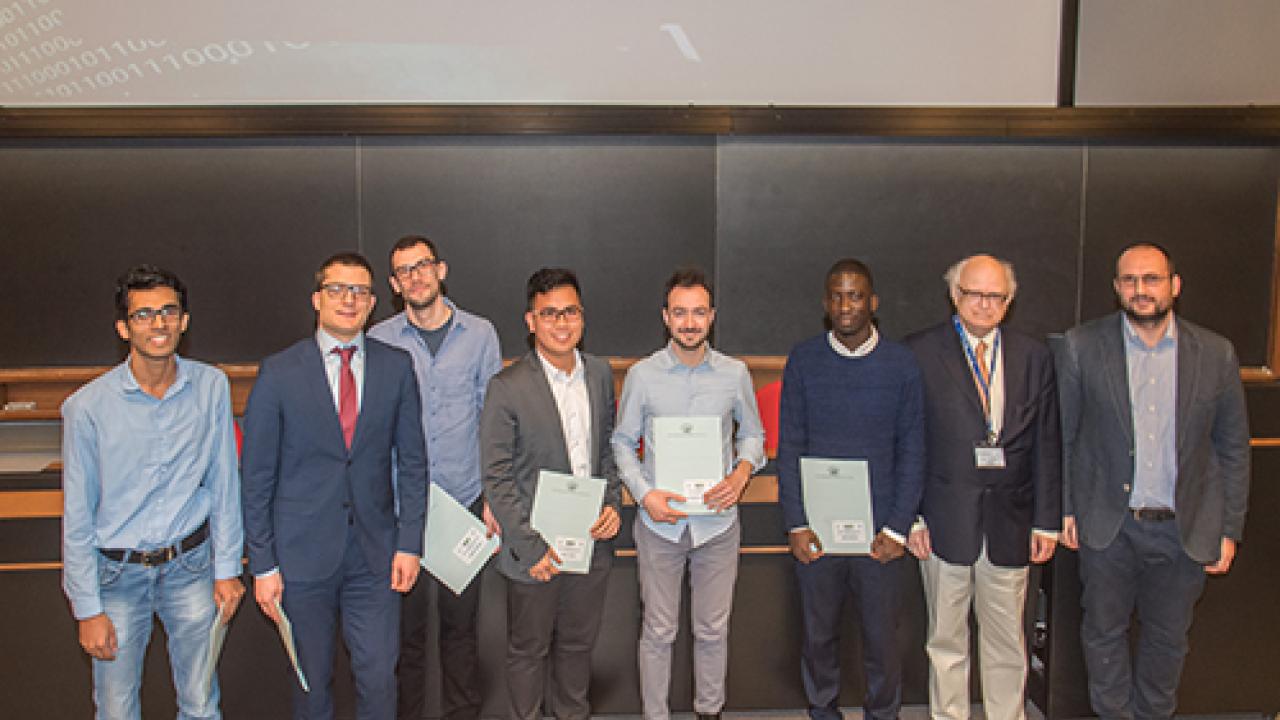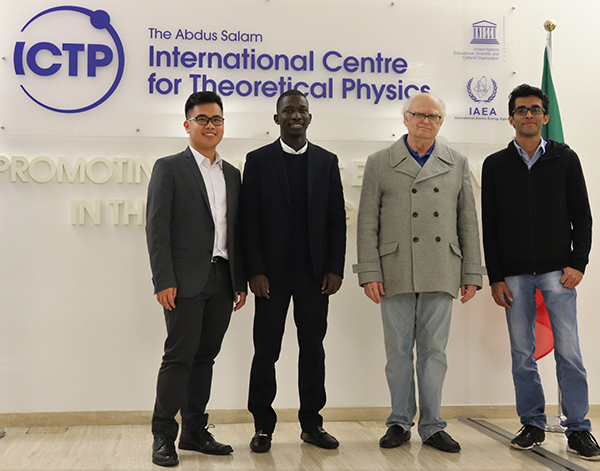
The joint ICTP-SISSA program granting a Master's in High Performance Computing has graduated its third class. Nine students received their diplomas after a year and a half of intense studies and thesis preparation. Of the nine, three from developing countries received scholarships from ICTP to support their studies:
- Anoop Chandran (India)
- Elliot Menkah (Ghana)
- James Vance (Philippines)
The graduation ceremony took place during a high-level, international conference focussed on high-performance computing. The MaX Conference on the Materials Design Ecosystem at the Exascale: High-Performance and High-Throughput Computing, held at ICTP from 29 to 31 January, gathered top researchers in the field of materials modelling, together with HPC and HTC experts, to discuss the most recent advancements.
 |
||
| MHPC graduates James Vance, Elliot Menkah and Anoop Chandran pose with Thomas Sterling (second from right), a MaX Conference attendee considered the father of cluster computing |
For the MHPC graduates, the MaX Conference provided a chance to see their academic work in action, through presentations on topics ranging from artificial intelligence in materials science to novel algorithms for first principles simulations. This reinforced the practical experience the students have gained from the MHPC's hands-on component, where the students develop and implement HPC projects in close cooperation with leading scientific groups. In the case of the three students supported by ICTP, that meant working closely with scientists in the Centre's Condensed Matter and Statistical Physics section and at SISSA.
Anoop Chandran says he always had research on his mind when he joined the MHPC programme; he plans to pursue a PhD in condensed matter physics. "The coursework and the project didn't disappoint me on that front. I hope the acquired expertise in HPC will enable me to maximise my performance in the field of research," he comments. Chandran worked with Professor Stefano de Gironcoli and at SISSA, and was co-supervised by HPC specialist Ivan Girotto and Filippo Spiga of Arm, Cambridge; his thesis detailed a performance study of Quantum ESPRESSO's diagonalization methods on cutting-edge computer technology for high-performance computing. Quantum ESPRESSO is a suite of open-source computer codes used for electronic structure calculations and materials modelling at the nanoscale. The Quantum ESPRESSO Foundation funded Chandran's studies.
Elliot Menkah performed his project under the supervision of ICTP scientists Ali Hassanali and Emiliano Poli, and Ivan Girotto. It involved the coupling of codes to enable petascale simulations of first principles modelling of both electrons and nuclei of thousands of atoms. He says he plans to complete PhD studies in physical chemistry at the Kwame Nkrumah University of Science and Technology in Ghana. He wants to pursue research on material science, with the goal of discovering an efficient harnessing of energy. "The MHPC project made me appreciate the interplay between scientific objectives and computational technology, as well as understanding high performance computing much more. I learned some new physics as well," he says.
James Vance found the most valuable part of the MHPC programme to be how it bridged his background as a physicist with his interest in programming. "These are skills that I would not have been able to acquire anywhere else", he says. His project on "Large Scale Implementation of the Density Matrix Renormalization Group Algorithm” involved exploiting parallel linear algebra libraries to efficiently perform the algorithm on a world-class supercomputing infrastructure such as CINECA Marconi, the Italian supercomputer Working under the supervision of ICTP condensed matter physicist Marcello Dalmonte and HPC applications specialist Ivan Girotto, Vance developed code to study frustrated spin systems on two-dimensional geometries in the search for topological phases of matter. His project has been extended for another few months, after which he intends to begin PhD studies so he can continue to apply the skills he has learned to other research areas. To that end, he has recently been accepted into a PhD programme at the Johannes Gutenberg University Mainz and the Max Planck Institute for Polymer Research, where he will study high-performance computing and computer simulations in condensed soft matter. "Eventually, I want to go back to the Philippines and help in improving our country’s competitiveness in the HPC and scientific computing sectors," Vance explains.
As most visitors realize after spending some time at ICTP, the social and multidisciplinary interactions with people from around the world are as valuable as what they learn in a conference hall or classroom. "The MHPC programme has students from diverse disciplines: in our batch, we had people from mathematics, physics, engineering and computer science," says Chandran. He adds, "This heterogeneity is also reflected in thinking and problem-solving, allowing one to learn and tackle problems in ways that are not constrained to a particular school of thought. So, for me, problem-solving became not only simple but also fun with the help of my colleagues. I would say this is the most valuable part of the MHPC."
--Mary Ann Williams
















